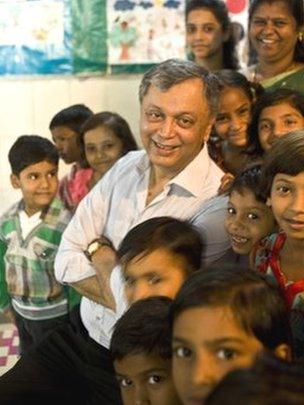Madhav Chavan wins education 'Nobel prize'
- Published

This year's winner of one of the biggest awards in international education is Madhav Chavan - who has provided an education for millions of impoverished families in India.
Dr Chavan has won the WISE Prize, which has been likened to a "Nobel prize for education".
The award, announced on Tuesday at the WISE summit in Qatar, recognises his education work in the slums of Mumbai.
"Much more remains to be done," said Dr Chavan, when he received the prize.
The international award, which comes with a prize of $500,000 (£314,000), recognises Dr Chavan's efforts to provide lessons in literacy and numeracy for disadvantaged children and adults in India.
The award is decided by an international jury, including the US Librarian of Congress, Dr James Billington; the president of Peking University, Prof Zhou Qifeng; former UN high commissioner, Mary Robinson and the chairman of WISE, Dr Abdulla bin Ali Al-Thani.
It was announced in Doha, capital of Qatar, during an international education summit, which is creating a Davos-style platform for debates and events to encourage innovation and improvement in education.
Among the themes will be finding ways to reach the 61 million children in the world who do not receive even a basic primary education.
The event also reflects the importance being placed by oil and gas-rich Qatar on developing an education system that will secure the country's economic future when its natural resources run out.
Low cost, high impact
Dr Chavan began his social activism helping uneducated slum-dwellers in Mumbai in the late 1980s, when he returned to India after studying in the United States.
Working with Unicef and the city authorities, he developed an innovative system for providing lessons for large numbers of people at low cost.
His charity, Pratham, ran lessons in temples and offices and recruited volunteers from the local community.
This expanded to other cities and states to become the largest non-governmental education provider for deprived children in India.
As well as improving the quantity of education, Dr Chavan also made efforts to improve the quality. He set up a project to address the problem of children who were in school but still had low levels of literacy.
He has also developed a system for monitoring the impact of education projects - so that further efforts could be more carefully targeted.
"Some 25 years ago I saw that new thinking was needed to improve the lives of the millions of underprivileged in my country," he said, receiving the WISE Prize.
"This prize is a major landmark that reminds me how much more remains to be done. It is an enormous honour for me to be recognised by this unique community of innovators," said Dr Chavan.
Dr Abdulla bin Ali Al-Thani said the award winner had "brought light into the lives of many millions of people".
"His story combines the passion of a social entrepreneur with the patience and method of a scientist. His approach shows that the most important resources for successful innovation are a clear vision, determination and the ability to apply unrecognised capacities to a shared cause."
- Published9 November 2011